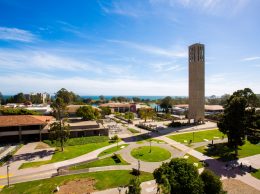UCSB to offer graduate tech management degree
IN THIS ARTICLE
- Technology Topic
- Stephen Nellis Author
By Stephen Nellis Friday, February 1st, 2013
UC Santa Barbara’s Technology Management Program, an effort launched in 1998 that has generated a number of successful South Coast companies, is gearing up to offer graduate degrees that its leaders call “an MBA for engineers.”
The current program grants certificates and is open to both technical and non-technical majors alike. Through guest lectures by successful private-sector leaders and rigorous coursework, it explores the critical intersection between research, technology and entrepreneurship. Its annual New Venture Competition routinely draws hundreds of businesspeople and has produced companies such as Inogen, Active Life Scientific, Birdeez and aPeel Technologies, among others.
However, the program, which goes by TMP on campus, currently only grants a certificate. Students must obtain a degree in another major. After several years of internal campus politicking, the program’s leaders have secured academic unit status for the TMP.
“The reality is that it’s been functioning like a business program on campus,” said Bob York, the program’s director and a professor of electrical and computer engineering. “The new degree is formalizing a lot of what we’ve already been doing. The certificate program is like a mini-MBA for undergrads.”
But the first efforts, which could be open for enrollment in 2014, will be a one-year graduate program aimed at the thousands of technology professionals who work near the UCSB campus.
While CSU Channel Islands and Pepperdine University are offering classes in Santa Barbara for an MBA program, there’s nothing that focuses on the management and leadership issues that arise specifically in the technology business.
“For years we’ve had local businesses come to our campus and say, ‘Is there anything you have that our executives can take courses in?’ And for years we haven’t had anything.”
York said the program will differ considerably from an ordinary MBA. For starters, it will assume that attendees are proficient in quantitative fields such as math and science and move briskly through finance and accounting material. That will leave more time to “focus on some of the soft skills of business that, quite frankly, some scientists and engineers aren’t all that good at. That’s probably going to play a bigger role than it would in other programs,” York said. “Commercializing a new technology is really less about the technology and more about the people.”
The TMP is also aiming to build out an “executive learning center, with all the bells and whistles” to house its efforts and is conducting a faculty search. York said the university also aims to keep the cost lower than an MBA at other universities.
“There’s a fee for this program. It’s not as steep as an MBA. That will help us offset some of the costs. The way we’ve structured the program, the campus is providing space and faculty. The students will be paying a lot of the operational costs. That was a nice compromise — it allowed us to keep the cost down relative to an MBA program.”
York also said that undergraduate efforts could be undertaken in the future. In the meantime, securing academic unit status helps cement in place current pillars like the New Venture Competition, which, despite its massive draw, is mostly a labor of love that pulls together its budget from discretionary funds. “It’s grown tremendously over the years without having any formality as far as the campus is concerned. Anchoring it to an academic unit is an important step to keeping it there,” York said.
Davis Brimer, CEO of Active Life Scientific, said he specifically selected UCSB for his undergraduate degree because of the program. He wanted to learn what went into engineering, but ultimately wanted to be an entrepreneur. It was a perfect fit.
“I think it’s huge,” he said of the graduate program. “I have a lot of friends and colleagues who are trying to figure out how to get practical experience to achieve the things they want to do rather than just get another degree to put on their resume.”
What remains to be seen is how much of the TMP spirit will come through in the graduate program. Traditionally the program has focused tightly on startup businesses, but York said it’s also been teaching core business principles. There’s also the strong possibility that something a little more entrepreneurial than a traditional MBA is exactly what tech companies are looking for.
Craig Cummings, a UCSB engineering alumnus and now entrepreneur-in-residence with the program, spent a successful career at tech giant SAIC, helping it grow from a handful of people into the tens of thousands. One of the company’s key innovations wasn’t technological, but structural. It would specifically start up its new businesses outside its main organization to imbue them with the entrepreneurial spirit that’s hard to pin down but so often dies in big corporations. He said technology executives understand the importance of the startup spirit and might tap the program for its entrepreneurial focus.
“For the people that are really going to carry the entrepreneurial spirit of your company, having them go back at some point in their career makes a whole lot of sense to me,” Cummings said. “What you don’t want to do is have those innovators within your company become defeated. It’s a good way to try to avoid that if you’re the executive of a big company.”











